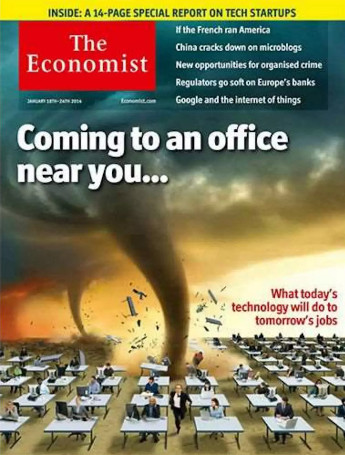Why it matters
Now we live in a Digital Age, and almost everything is
becoming automated. Even parenting2, a job in which
technology should have no role, is becoming automated to
a degree.
 'The Economist" predicts the coming storm.
'The Economist" predicts the coming storm.
In time, the impact of this is going to be felt at every
level of society. During a crucial stage of development,
when most children are still learning to process
empathy3 and develop a sense of morality,
many of today's kids are receiving more nurturing from
the internet than they do from their own parents.
We see the symptoms all around us every day. The
dramatic rise in childhood obesity, children showing up
to class feeling tired, children showing less interest
in their lessons — these are all signs that once
would have been alarming for teachers, but now we are
desensitized to them because they have become the new
normal.
So now we're here advocating for increased use of
computers in the classroom. The reason for this apparent
hypocrisy is that teachers can still play a nurturing
role for young minds. We may be powerless to control the
home environment, but we can control the school
experience for our students.
One of the most important things we can do is help
students develop truly useful skills with
technology. This does not mean some lame attempt to seem
like you're "with it" by unnecessarily
incorporating social media into your lessons. All this
achieves is reinforcment of the sterotype that
you're a dinosaur. The students are already adept
in the use of social media, and they most likely know
more about it than you do.
It doesn't help your students if your lesson only
consists of pointless "busywork". You have a
limited amount of time with your students each day, and
you should make the most of the time by designing
lessons that impart new skills and knowledge.
This can't happen if you're trying to teach
them things they already know. You have to connect with
students in a way that authentic teaching and learning
takes place.
Skills matter because the future is looking bleak for
the unskilled. Robots are planting fields and harvesting
the crops. In Japan, you will find robots cooking meals
and bringing them to the table. There are robots
cleaning toilets and mopping floors. In fact, for every
unskilled job you can imagine, chances are there's a
robot that can do it.
The only way to protect your students from this bleak
future is to help them learn skills so they can avoid
ending up in the "unskilled" category. By
making this your goal, you help protect your own job
from becoming irrelevant, because teaching is only a
profession for as long as it provides tangible results.